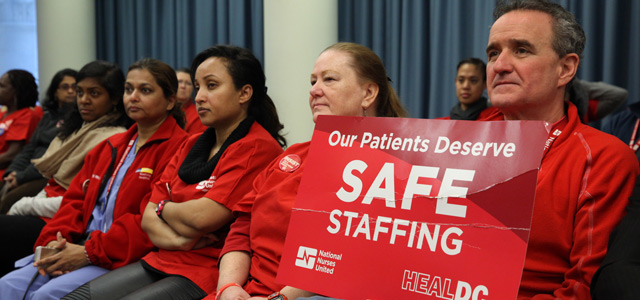Press Release
Nurses to Join Protest Monday Outside the Supreme Court

Nurses from Washington to California will gather on the steps of the U.S. Supreme Court Monday morning to warn that a controversial case targeting worker and union rights poses a significant threat to public health, safety and quality of life, warned National Nurses United, the largest U.S. organization of nurses.
What: Nurses join in protest at Supreme Court
When: Monday, January 11, 9 a.m.
Where: U.S. Supreme Court, steps, 1st and Maryland Ave., Washington, DC
Friedrichs v. CTA involves a challenge supported by far right, anti-union groups to the right of public unions to require all employees who receive the benefits of representation, including higher wages, safer working conditions and better benefits, to pay their fair share of the cost of representation.
Long established law already permits employees who object to a union’s political expenditures to withhold payment for certain union political activity. But the challenge by non-member teachers represented by the California Teachers Association goes far beyond the settled law of permitting union members to opt out of dues for politics, going directly to the heart of everything the union does in the realm of collective bargaining.
“For nurses, who depend on the protection of their union to be able to advocate, without fear of employer retaliation, for their patients at a time when massive healthcare corporations are placing profits over public and patient safety, the threat is particularly dire,” NNU co-president Jean Ross, RN.
“As nurses our ability to have a collective voice for our patients is critical. Without the support of our union, nurses have little protection to speak out and challenge unsafe staffing or other eroding patient care conditions that happen all too often in our hospitals,” said Martese Chism, RN who works in a major Chicago public hospital.
“Through our union, every day we advocate for patient safety, we advocate in the community for funding of our community hospitals,” said Rebecca Well, a San Diego area public hospital RN. “The Justices have a decision to make here as to whether they are on the side of nurses and patients or the corporate interests that are funding Friedrichs.”
The challenge to public unions parallels a growing corporate attack on private sector unions, represented by the push for anti-union laws in so-called “right to work” states. Statistics show a serious and dangerous erosion of public health standards in current “right to work” states, Chism noted.
“We know that in states that allow for the scheme Friedrichs is attempting to impose on all public sector nurses, that infant mortality rates are 17.7 percent higher and life expectancy is lower,” said Martese Chism. “For nurses, these appalling numbers are unacceptable.”
In 20 of 24 key measures affecting public health and safety, “right to work” states rank lower on average in poverty rates for children, infant morality, cardiovascular deaths, access to primary care physicians and mental health services, infectious disease control, occupational fatalities, and many other factors compiled by America’s Health Rankings.
Those same “right to work” states have seen significant declines in stagnant wages for most workers, declining relative living standards, and a massive gap in health and income inequality, notes NNU.
Workers in right-to-work states earn on average 12 percent less than workers in non-right-to-work states. Median household income is also 12 percent less.
Weaker unions – the goal of anti-union groups from the Koch Brothers to corporate-linked management law firms and consultants – also reduces the ability of workers through collective action to protect the public and their own health and safety. For example, the rate of workplace deaths is 54 percent higher in right-to-work states, according to Bureau of Labor Statistics data surveyed by the AFL-CIO.
“We’ve found right-to-work means lower pay, higher child poverty rates, and much greater income disparity,” said Well. “That’s the same reason why groups like supporters of Friedrichs v. CTA have targeted states like California that have avoided such anti-worker laws.”
“The clear goal behind Friedrichs has nothing to do with individual rights, and everything to do with the larger far right and corporate goals of defunding and crippling all unions and their ability to represent their members and the public interest,” said Ross.
If the Supreme Court overturns the decision of the 9th Circuit Court of Appeals, public sector unions could be barred from requiring any fair share payments from any represented employees even while still being mandated, at considerable cost, to represent all employees in bargaining for wages, health benefits, staffing levels and other conditions of employment – in effect subsidizing free riders, says NNU.
“The architects of this move are the management-linked groups, funded by some of the wealthiest corporate interests in the U.S. whose goal is to eliminate the ability of all workers to have a voice in the workplace or limit the ability of corporations to put profits ahead of worker rights, workplace rights, and in the case of nurses, patient health and safety,” Ross said.